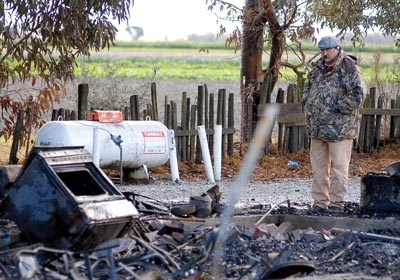Every summer and fall the Wildlife Education and Rehabilitation Center in Morgan Hill receives calls from well-meaning people who have taken in an orphaned baby animal (often a bird) in the spring, and raised it in their home. The animal is now grown up and the caller wants to know where and how it should be released.
WERC volunteers always sigh and brace themselves mentally and emotionally to hear about these animals. A creature’s life may have been saved, but there are still sometimes-impossible hurdles to overcome.
The problem is that when a young creature is not raised with others of its own kind, it may imprint on its caregivers. Imprinting is “a species-specific … learning during a critical period of early life in which social attachment and identification are established.” (National Wildlife Rehabilitators Association Quick Reference manual, 3d ed.)
In other words, an imprinted animal does not recognize others of its own species and instead identifies with the humans who raised it. As a result, depending on the species, it may become dangerous by approaching humans in inappropriate ways. (For example, a large hawk or owl might fly at an unsuspecting human and injure him or her with its talons.) In any case, an imprinted animal will not know how to hunt or how to find its natural food, and is unlikely ever to be able to survive on its own in the wild.
For those reasons, the California Department of Fish and Game (now California Department of Fish and Wildlife,) prohibits releasing an imprinted animal. California law also prohibits the keeping of a wild animal (with few exceptions) as a pet. If it cannot be released and cannot be kept as a pet, what can be done with it?
Sadly, unless the animal can find a home with a licensed wildlife center as an educational ambassador, under California law it must be humanely euthanized.
WERC is licensed to keep several animals as “educational ambassadors.” These animals have an injury (such as an irreparably injured wing) or condition (such as imprinting) which makes it impossible for them to survive in the wild. They are brought to classrooms to teach school children about wildlife, and to public events, such as Taste of Morgan Hill and Gilroy’s Earth Day, to educate members of the community. A separate license is required for each animal, and there are both space limitations and legal restrictions on the number of educational ambassadors any wildlife center can have.
Depending on the species (some imprint more easily than others,) an animal which comes to WERC having been raised by people is likely to be imprinted. We try our best to “un-imprint” it by placing it in an enclosure furnished to replicate its natural habitat as closely as possible, by not talking to it or approaching it, and by yelling at or scaring it (in a non-hurtful way, of course) if it approaches a human caregiver. Ideally, such an animal is placed with a non-imprinted animal of the same species, in the hope that it will acquire “wild” habits. If this is not possible, a mirror is placed in the enclosure so the animal can see what its species looks like.
Sometimes we are successful, sometimes not.
If the animal can be “un-imprinted” it will be released back to the area where it was found, or to an appropriate habitat in the same vicinity. If it cannot be “un-imprinted” and WERC cannot keep it as an educational ambassador, we make every effort to place the animal with another wildlife organization. A nationwide network of wildlife organizations exchanges information about animals that need placement. If the animal cannot be placed, however, the result is tragic.
Nesting season is beginning, and young animals will soon be appearing. Often, a baby animal whose parent is not in sight does not need our help. The mother may be eating somewhere nearby. Mother deer leave their fawns during the day to graze, as fawns do not have a scent and the mother does not want to attract predators. Most mother birds will still feed their chicks if they have fallen out of the nest.
If you find an orphaned wild animal, before picking it up or moving it, please call WERC at 408 779-9372, or another licensed wildlife center, for advice.
WERC is a licensed 501(c)(3) organization which has been providing wildlife education and rehabilitation services in the South County for more than 30 years.









